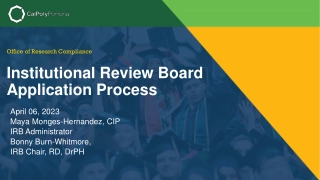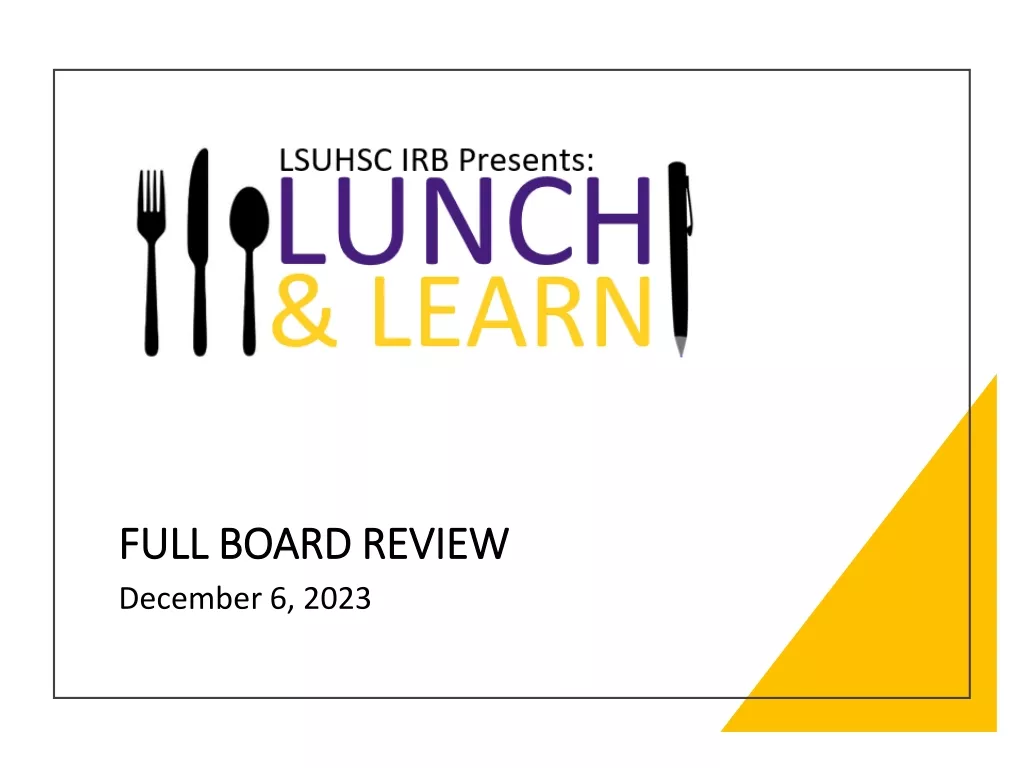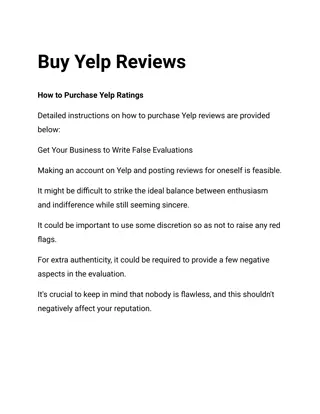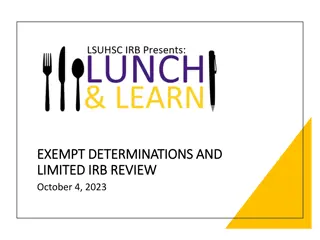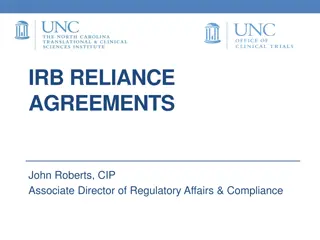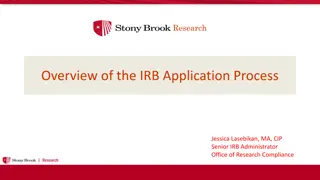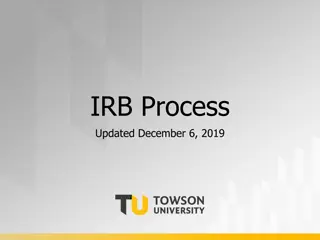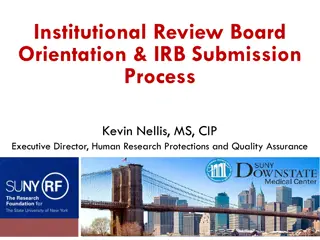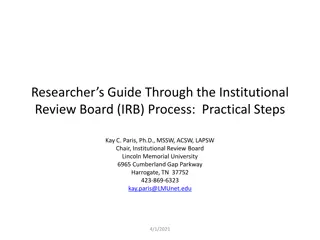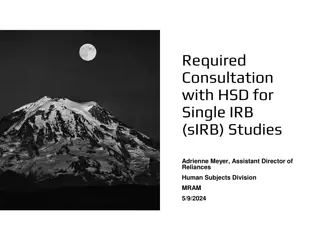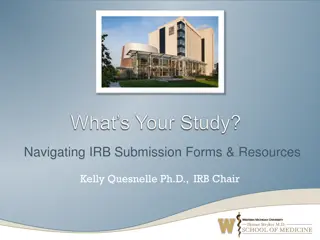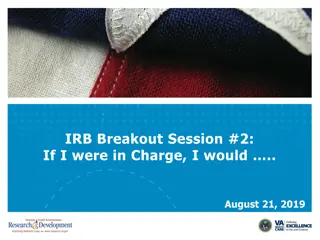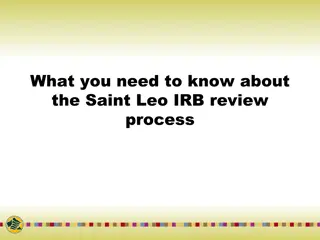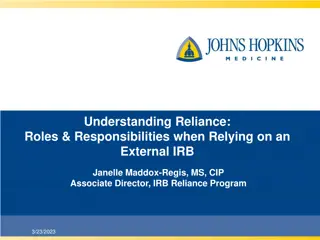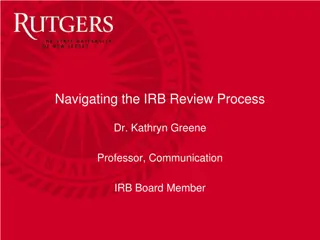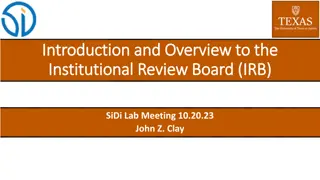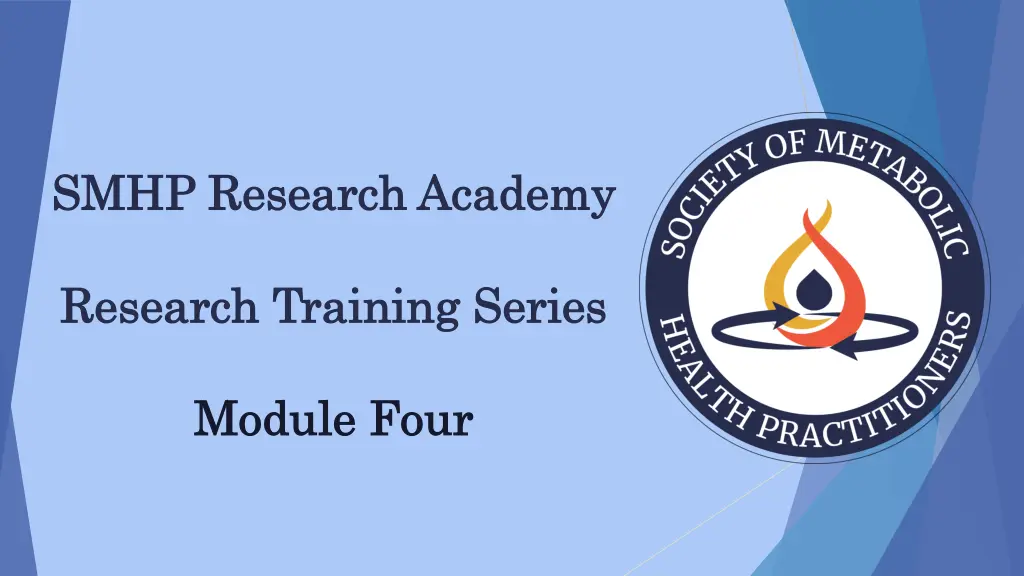
Understanding the Role of Institutional Review Boards
Explore the history, functions, and significance of Institutional Review Boards (IRBs) in overseeing ethics in research involving humans and animals. Learn about different types of IRB reviews, informed consent essentials, and alternative options to university IRBs.
Download Presentation

Please find below an Image/Link to download the presentation.
The content on the website is provided AS IS for your information and personal use only. It may not be sold, licensed, or shared on other websites without obtaining consent from the author. If you encounter any issues during the download, it is possible that the publisher has removed the file from their server.
You are allowed to download the files provided on this website for personal or commercial use, subject to the condition that they are used lawfully. All files are the property of their respective owners.
The content on the website is provided AS IS for your information and personal use only. It may not be sold, licensed, or shared on other websites without obtaining consent from the author.
E N D
Presentation Transcript
SMHP Research Academy SMHP Research Academy Research Training Series Research Training Series Module Four Module Four
The Society of Metabolic Health Practitioners The Society of Metabolic Health Practitioners Research Training Series Research Training Series Module Four Module Four The Role of the IRB and Types of Review The Role of the IRB and Types of Review Presented By: Dr. Melanie M. Tidman DHSc, MA, OTR/L, MHP 2
Research Training Video Modules Research Training Video Modules Module One Module One Preparing a Clinical Question for Investigation: What is a PICO(T) Preparing a Clinical Question for Investigation: What is a PICO(T) Module Two Module Two Reference Software and Reference Database Management Reference Software and Reference Database Management Module Three Module Three Study Design and Definition of Variables Study Design and Definition of Variables Module Four Module Four The Role of the IRB and Types of Review The Role of the IRB and Types of Review Module Five Module Five Evaluating the Quality of Research Articles Evaluating the Quality of Research Articles Module Six Module Six The Application of the PDSA Project Model The Application of the PDSA Project Model Module Seven Module Seven Types of Research Articles Types of Research Articles Module Eight Module Eight A Brief Review of R A Brief Review of R, SPSS , SPSS and Python for Data Analysis and Python for Data Analysis Module Nine Module Nine The Search for a Journal and Navigating the Author Guidelines The Search for a Journal and Navigating the Author Guidelines Module Ten Module Ten Preparing the Manuscript Preparing the Manuscript 3
Objectives Objectives Discuss the history and role of the Institutional Review Board (IRB) Discuss the history and role of the Institutional Review Board (IRB) in the oversight of the ethics in human (and animal) research. in the oversight of the ethics in human (and animal) research. Discuss the types of Reviews done by the IRB. Discuss the types of Reviews done by the IRB. Discus the concepts, importance, and inclusive elements of Informed Discus the concepts, importance, and inclusive elements of Informed Consent. Consent. Review public, open Review public, open- -source alternatives to a University IRB. source alternatives to a University IRB. 4
Historical Background of the IRB: Research and Historical Background of the IRB: Research and Ethical Protections (White et al, 2020) Ethical Protections (White et al, 2020) The Tuskegee Experiments (1932) The Nuremberg Trials (1945) The Declaration of Helsinki (1964) The Belmont Report (1979)
The Tuskegee Experiments The Tuskegee Experiments 1932 The Tuskegee Institute began a study to record the natural history of Syphilis. Study Consisted of 600 Black Men 399 with Syphilis, all others did not have the disease Informed consent was NOT obtained Researchers did NOT explain the nature of the disease: bad blood Participants Received: free medical exams free meals, and burial insurance Participants were NOT offered treatment for the disease.
The Tuskegee Experiments, CONTD The Tuskegee Experiments, CONT D A class-action lawsuit was filed in 1973 on behalf of the study participants and their families Resulted in a $10 million out-of-court settlement in 1974. On May 16, 1997, President Bill Clinton issued a formal Presidential apology for the study.
The Nuremberg Trials The Nuremberg Trials November 1945 to October 1946 Resulted from experimentation, characterized as War Crimes, committed during WWII against prisoners of Nazis in Concentration Camps. International Military Tribunal (IMT) in Nuremberg, Germany, met to prosecute and punish the major war criminals of the European Axis just after WWII (history.state.gov, 2023). Created guidelines for research to mandate voluntary consent and that the benefits of research must outweigh the risks (ors.unkc.edu, 2023).
The Declaration of Helsinki The Declaration of Helsinki 1964 Discussed the ethical treatment of participants from vulnerable populations when conducting research. Aims to prevent exploitation or mistreatment of subjects. Requires researchers to consider the issues involving vulnerable participants when conducting research.
The Belmont Report The Belmont Report Published in 1979 by The National Commission for the Protection of Human Subjects Defines Concepts of (in research for participants): respect, nonmaleficence, beneficence, and justice. Defines Vulnerable Populations Minors, incarcerated persons, pregnant women, individuals with mental or cognitive impairments, and socially or economically disadvantaged individuals (Office for Human Research Protections, 2021). Guards against the manipulation or mistreatment of research participants and ensures no coercion is or was done.
The Common Rule, 45 Code of Federal The Common Rule, 45 Code of Federal Regulations (CFR) part 46 subpart A Regulations (CFR) part 46 subpart A Outlines the role of the Institutional Review Board (IRB) Guides the IRB review of research study design, variables, informed consent, and protocols. Protects research subjects and researchers: Provides an unbiased, outside ethics perspective (Mabrouk, 2021). Emphasizes informed consent, recruitment, equitable selection of participants, risk minimization, and safeguards for vulnerable participants. Resulted in what is referred to as the Common Rule in Research New Common Rule enacted in 2018
Evolution of the Common Rule Originally established in 1981 to guide Informed Consent Multiple Revisions over the years, with the most recent in 2018 New Guidelines include: A reasonable person makes an informed decision about participation Opportunity to discuss the information. Informed Consent: key information organized to facilitate understanding of the reasons why one might or might not want to participate.
Roles and Responsibilities of the IRB Roles and Responsibilities of the IRB Ethical oversight for research involving human and animal subjects. Ensures informed consent, safeguards participants' rights, and assesses potential risks and benefits Ensures crucial details of the study which could compromise the transparency and validity of the research process are clarified and justified.
Collaborative Institutional Training Initiative Collaborative Institutional Training Initiative (CITI Program) (CITI Program) CITI Certification is required by some entities, grants or registries when conducting research. IRBs require this or other training prior to applying. Train in research ethics, compliance, and other professional development education. Packages (to become certified) available for individuals (US). Organizations and Research Institutions probably already have a subscription. (citiprogram.org)
Studies Exempt from IRB Review Studies Exempt from IRB Review These studies may be exempt from the specific regulations and requirements in the Common Rule. Common Rule does not apply if human subjects not used. These types of studies provide no greater than minimal risk to participants. A study can still be exempt from IRB Review and have human subjects.
Examples of Studies Exempt from IRB Examples of Studies Exempt from IRB Educational settings that specifically involve normal educational testing and practices. Interactions only with scores on educational tests. Benign questionnaire-type interventions along with collecting information from an adult subject through written responses. Anonymous Online Surveys
Studies with Expedited IRB Review Studies with Expedited IRB Review No more than minimal risk to participants and do not meet any of the criteria for exempt status. Does not involve any vulnerable populations: Minors Pregnant Subjects Incarcerated Individuals Individuals with Impaired Cognition or Decision- making Capacity Socio-Economic or Educationally Disadvantaged Persons
Studies that Require Full Board Studies that Require Full Board IRB Review IRB Review Vulnerable Participants Procedures that could possibly cause physical harm. Procedures at risk for causing significant psychological/emotional distress. Sensitive Information that could seriously harm the participant legally, socially, financially etc., if other people could identify them (USFDA.gov, 2023)
University IRB Reviews University IRB Reviews Require CITI Training Require a Financial Conflict of Interest Training Certificate and Disclosure Documentation. Have their own specific and detailed application, submission criteria, forms, and associated policies. Require updates and amendments if the research protocol changes in any way. Typically, Full Boards only convene once monthly which can make the process of obtaining approval delayed. Scrutinize and approve the Informed Consent forms. Sometimes will not approve interventional studies due to their own limitations.
Open Source IRBs Open Source IRBs Private IRBs have reviewers and consultants with expertise in specific subject areas or participant populations (e.g., vulnerable populations). Can work with researchers not affiliated with a University program or organizations which have an IRB. Can process study applications on a timelier basis and convene a full board meeting as needed. Can provide Ethics training and oversight for a fee. Fees range from $2000 (US) and higher according to which type of Review is required. Examples: Pearl IRB, Solutions IRB, etc. (there are others).
Summary Summary Historical events of misconduct and harm in research necessitated the Historical events of misconduct and harm in research necessitated the creation of policies known as The Belmont Report, The Nuremberg Code, creation of policies known as The Belmont Report, The Nuremberg Code, and the Declaration of Helsinki. and the Declaration of Helsinki. The Common Rule guides the IRB in adherence to ethical guidelines in the The Common Rule guides the IRB in adherence to ethical guidelines in the conduct of research. conduct of research. Vulnerable populations will need special protections and a Full Board Vulnerable populations will need special protections and a Full Board Review Review Surveys and non Surveys and non- -interventional studies may qualify as Exempt or interventional studies may qualify as Exempt or Expedited Reviews, especially if they do not involve vulnerable Expedited Reviews, especially if they do not involve vulnerable populations. populations. Universities often provide an IRB process and CITI training free of charge. Universities often provide an IRB process and CITI training free of charge. For those not affiliated with a University, Open Source IRBs exist to For those not affiliated with a University, Open Source IRBs exist to oversee research studies for adherence to ethics and NIH guidelines for a oversee research studies for adherence to ethics and NIH guidelines for a fee. fee. 22
References References CITI Program (2024). Responsible Conduct of Research. https://about.citiprogram.org/series/responsible-conduct-of-research- rcr/?gad_source=1&gclid=Cj0KCQiAxOauBhCaARIsAEbUSQQ21rCGCtGNLXlpbNaa JiknZEhebYz2NsZZ0VKN1_CY7KQH3ztXFhIaAj9xEALw_wcB LeCompte LL, Young SJ. Revised Common Rule Changes to the Consent Process and Consent Form. Ochsner J. 2020 Spring;20(1):62-75. doi: 10.31486/toj.19.0055. PMID: 32284685; PMCID: PMC7122264. Pearl IRB. (2024). https://www.pearlirb.com/ Solutions IRB. (2024). https://www.solutionsirb.com/ 23
References Contd The US Food and Drug Administration. (2024). Institutional Review Boards (IRBs) and Protection of Human Subjects in Clinical Trials. https://www.fda.gov/about-fda/center-drug-evaluation-and-research- cder/institutional-review-boards-irbs-and-protection-human-subjects- clinical-trials University of Missouri at Kansas City. (2024). Research Services: Resources. https://ors.umkc.edu/resources/index.html White MG. Why Human Subjects Research Protection Is Important. Ochsner J. 2020 Spring;20(1):16-33. doi: 10.31486/toj.20.5012. PMID: 32284679; PMCID: PMC7122250. 24
Acknowledgements Acknowledgements Sincere Thanks to the Society for Metabolic Health Practitioners for their support of this Research Training Series A/V Editing & Tech Support: Bryson Tidman PowerPoint/Graphic Design: Kathryn Tidman 25
SMHP Research Academy SMHP Research Academy Research Training Series Research Training Series Module Four Module Four


